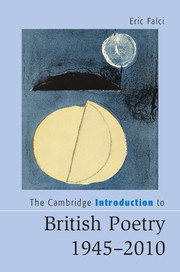Book contents
- Frontmatter
- Contents
- Acknowledgments
- Introduction
- Chapter 1 The Movement and Its Discontents
- Chapter 2 Decolonizing Poetry
- Chapter 3 Local Modernism
- Chapter 4 Late Modernism
- Chapter 5 The North
- Chapter 6 New Narratives
- Chapter 7 Platforms and Performances
- Conclusion: Archipelagic Experiments
- Notes
- Further Reading
- Index
- Cambridge Introductions to Literature
Conclusion: Archipelagic Experiments
Published online by Cambridge University Press: 05 November 2015
- Frontmatter
- Contents
- Acknowledgments
- Introduction
- Chapter 1 The Movement and Its Discontents
- Chapter 2 Decolonizing Poetry
- Chapter 3 Local Modernism
- Chapter 4 Late Modernism
- Chapter 5 The North
- Chapter 6 New Narratives
- Chapter 7 Platforms and Performances
- Conclusion: Archipelagic Experiments
- Notes
- Further Reading
- Index
- Cambridge Introductions to Literature
Summary
A book such as this one edges toward precarity as it approaches the present. It becomes less possible to survey the field as the historical distance closes on the surveyor. One's choices about what to cover become increasingly contingent, and one's speculations occur on ever-shakier ground. New volumes of poetry appear constantly and in seemingly ever-larger numbers, although large commercial publishers bring out fewer and fewer of them. Seeking to comprehensively review and evaluate the past decade or so of British poetry seems an act of hubris or folly, inevitably devolving into a partisan or scatter-shot review-essay or a very long list. Any judgment is premature, and every name mentioned is a name dropped. If as formidable a critic as F.R. Leavis could get things so splendidly wrong in New Bearings in English Poetry (1932) by naming Ronald Bottrall as the great hope of English poetry in the 1930s, then perhaps prognostication is not the best path forward. Focusing on the prize-winning volumes from the past ten or fifteen years does not produce a capacious enough picture of twenty-first-century British poetry, but simply railing against the whole machinery of literary awards, the mainstream publishing establishment, and its tight reviewing network is equally limited. Thrilling, perhaps, and necessary, but less useful in this context. So, in this conclusion, I will attempt neither a full summary of recent poetry nor a tendentious essay highlighting the poems that I like best.
Rather, I will focus on two topics in order to shed some light on recent practice. First, I will consider the ways in which poets have extended and compounded linguistic registers in order to accommodate the baggy capacity of contemporary English(es), routing this consideration through a look at the work of Daljit Nagra, Jen Hadfield, and Caroline Bergvall. I will then examine several ways that poets have stretched lyric form, absorbing disparate genres and mediums in order to register the hypermottled modes of contemporary social and cultural life. This final section will feature texts by Alice Oswald and Keston Sutherland. To be sure, there is significant overlap between these two issues, and my separation of them here is merely an analytical gambit. Much of the most intriguing poetry of the new century is profoundly heterogeneous.
- Type
- Chapter
- Information
- The Cambridge Introduction to British Poetry, 1945–2010 , pp. 208 - 230Publisher: Cambridge University PressPrint publication year: 2015

